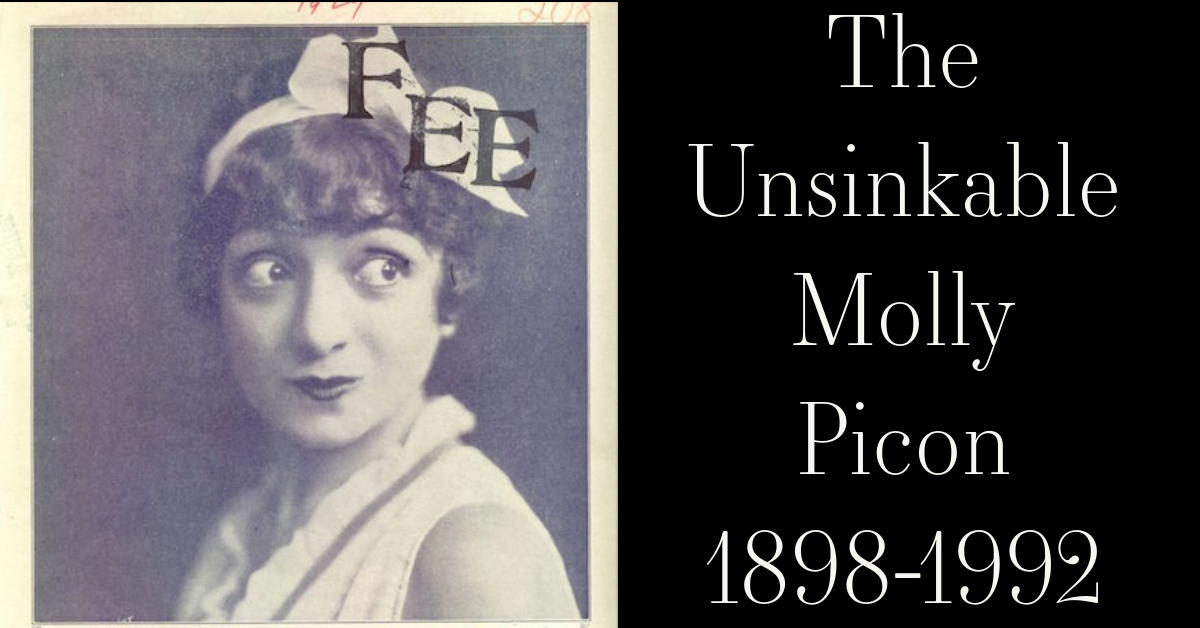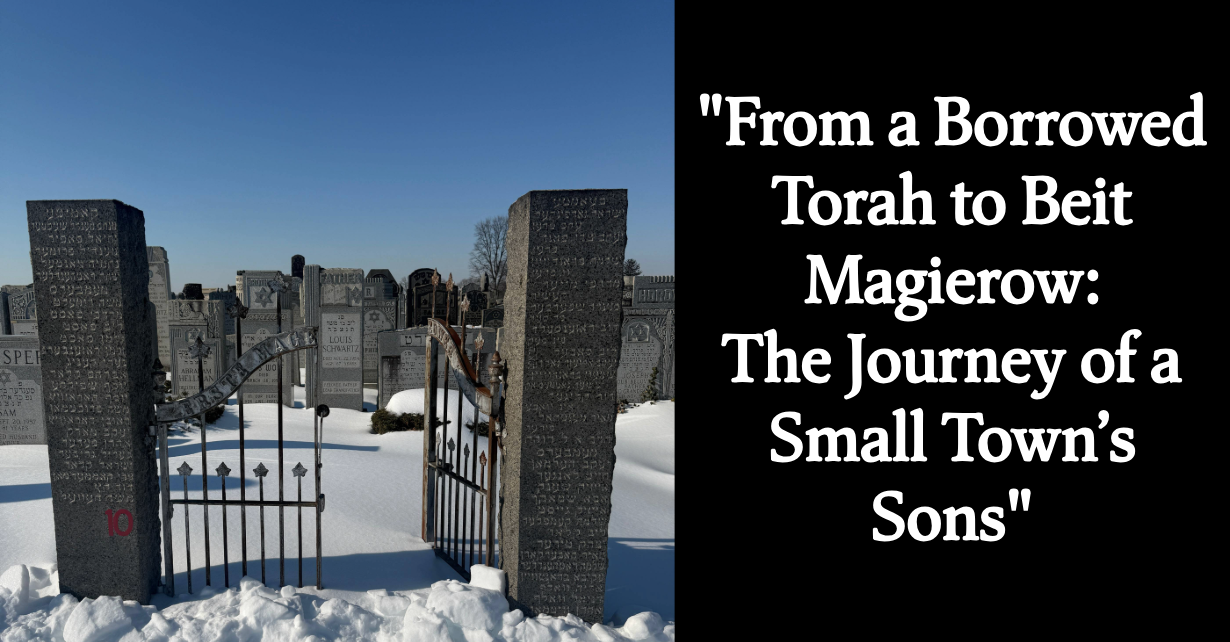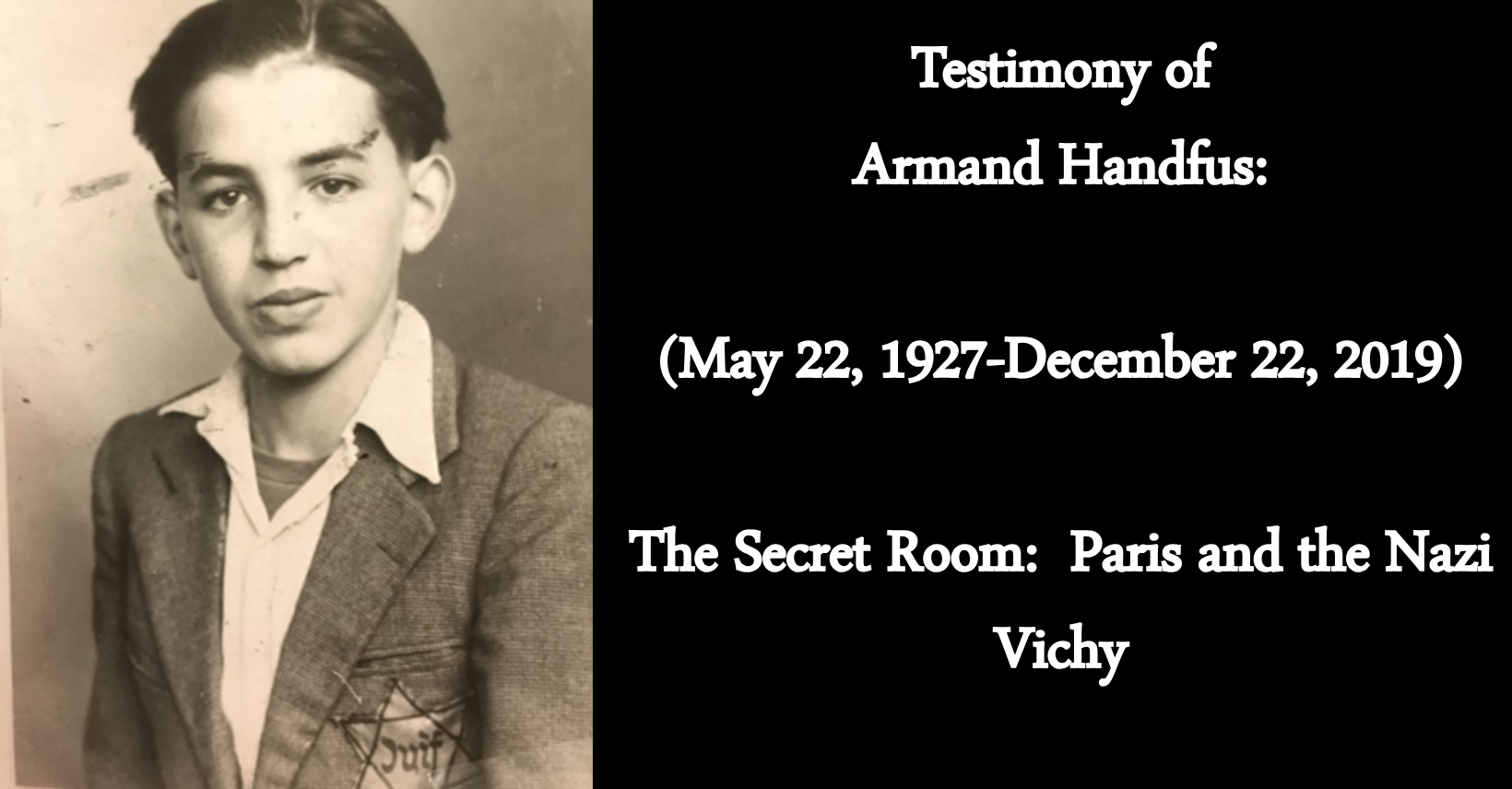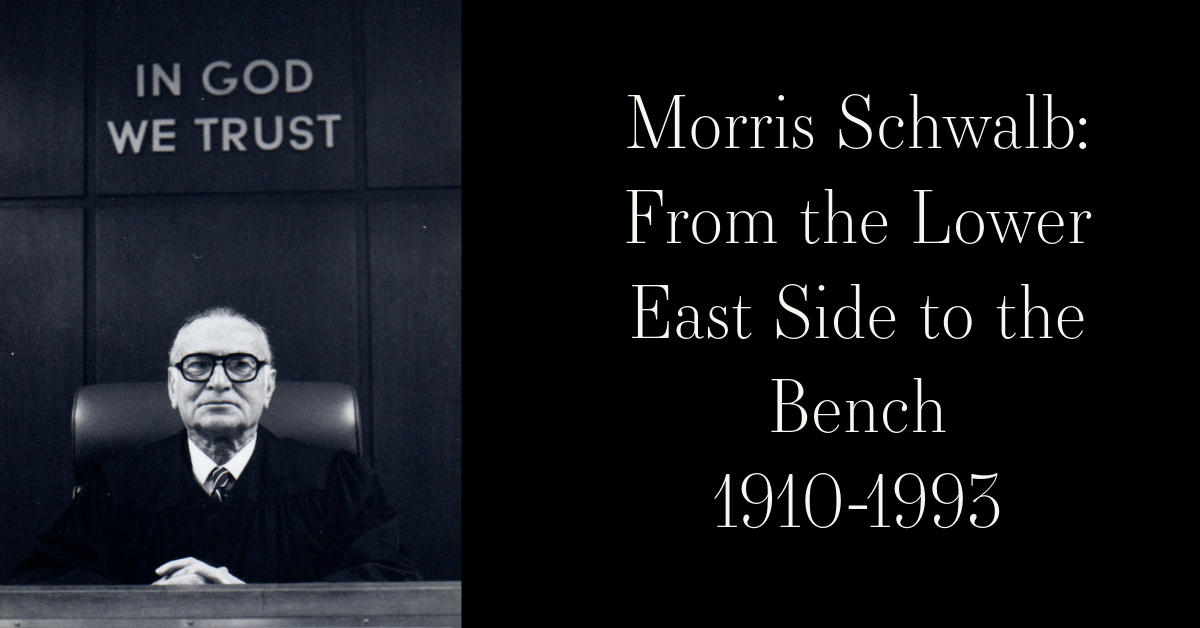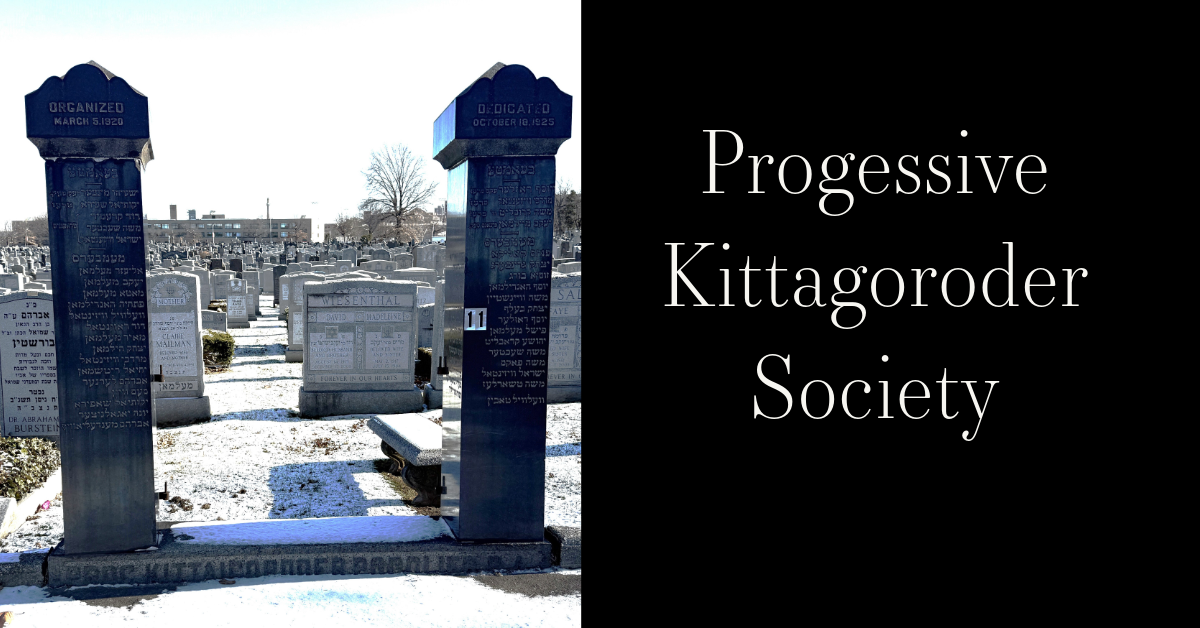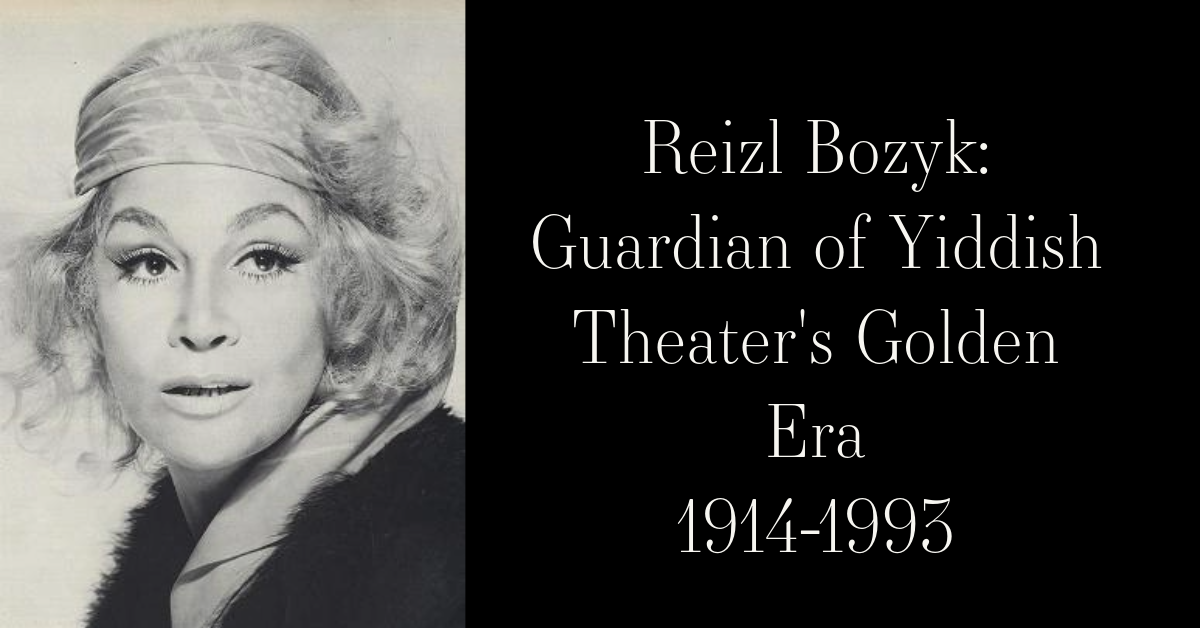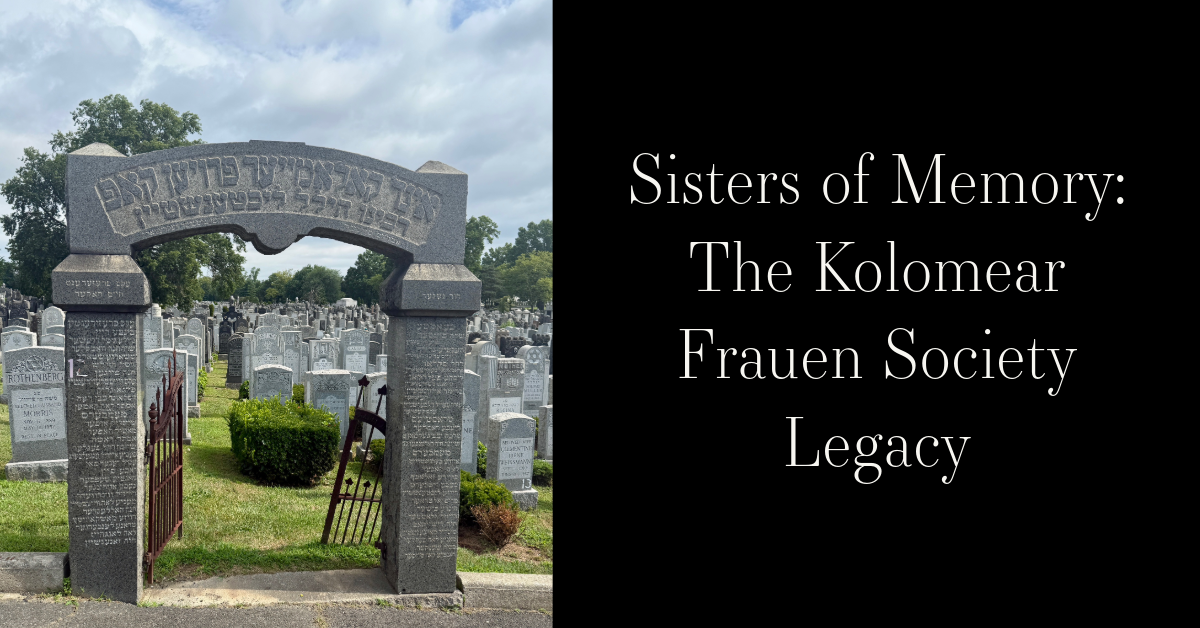Molly Picon - Di Yidishe Helen Hayes

Molly Picon was born on February 28, 1898 and was named Margaret (Malka) Pyekoon. She grew up in a tenement on Broome Street, on the Lower East Side of Manhattan to parents who were immigrant garment workers. Molly and her family resided with three generations of Picons, including nine of Molly’s cousins. Her mother’s name was Clara Ostrovsky (Ostrow) and she left her hometown in Rizshishtchov near Kiev, Russia in 1890, with her 11 siblings prior to the pogroms.
Molly’s father, Louis Picon was born in Poland. He studied for the Rabbinate in Warsaw. Louis married his first wife in Warsaw, Poland but reportedly did not divorce her before emigrating to the USA. Louis was unhappy that his first daughter, whom he called “Molly Dolly,” was a girl. Louis came and went throughout Molly’s early years. He worked only intermittently and thought he was too “educated” to take jobs that were menial labor. The family moved around when Molly was very young and lived in New Jersey and Chicago. Louis left for good when Molly’s younger sister, Helen, was born. At this point, Helen, Molly, Clara and Clara’s mom relocated to Philadelphia. Clara supported her family by taking in boarders as well as working as a dressmaker for the actresses at Kessler’s Yiddish Theater. This is how Molly became exposed to the stage.z

When Molly was 5 years old, her mother took her on an excursion to the Bijou Theater where there was a talent contest. When Molly and Clara were still on the trolley, an inebriated man approached them. He stared at Molly’s costume, and he asked her to perform for him right on the trolley. Molly consented and at the end, she included an imitation of the inebriated man himself. The man was so impressed by Molly that he collected pennies for her from the other passengers who were also watching. Later, at the Bijou Theatre contest, Molly won the first prize of $5.00. This was the start of Molly’s theatrical career.
One of the actresses at the Kessler Yiddish Theater, told Clara about an opening for a child in the Mike Thomashefsky’s Yiddish Stock Company. At the age of 6, Picon began playing children’s parts in Thomashefsky’s company. She even studied piano with Fanny Thomashefsky. Soon, Molly started song and dance routines at local theaters and she had a role in a Yiddish language dramatization of Uncle Tom’s Cabin.

At the age of sixteen, Molly dropped out of William Penn High School to take a role in a traveling vaudeville show called, The Four Seasons. This troupe arrived in Boston at the height of the 1918 influenza epidemic. The Four Seasons show fell apart due to a lack of available work. All the theaters in the city except one were closed. The only theatre that remained active was a Yiddish language group that held performances at the Boston Grand Opera House. In 1919, Molly answered an advertisement that Jacob Kalich, the producer, placed in a newspaper looking for a “lively ingenue.” Jacob cast Molly.
Within a year of Molly taking this job, Jacob popped the question. When Molly did not accept at that point, Jacob continued proposing to Molly. In fact, Jacob proposed in five different languages as well as broken English. When Molly finally accepted, the couple formally announced their engagement on stage. In 1919, Molly and Jacob were wed. Molly always remembered her unique wedding dress which was sewn by her mother from a theater curtain from the Kessler Yiddish Theatre. About their engagement, Molly quipped, “I always said, influenza was our matchmaker.”

In 1920, Molly had a still born daughter. This event rendered her unable to bear any more children. In 1942 Molly and her husband sponsored a foster child, George Weinstein, a seventeen-year-old Belgian Jew living in London. In 1955 in Israel, Molly and Kalich adopted Meira, the daughter of Picon's deceased stepbrother by her father's first wife. Every few years, Molly returned to Israel and adopted children. Kalilch and Molly ended up with four adopted children whom they sent through college. When Molly’s children grew up, Molly had five "eyniklakh” (grandchildren).

In 1920, Molly and Jacob toured Europe. They saw Yiddish plays and devised new material that they performed to large crowds. Molly became so popular in the 1920’s, that many shows used her “adopted” name in their title. Molly became a star in Europe first. European Jews wrote to their American relatives about the new comedienne they had seen, which promoted interest in her in the US. Picon also began her film career, making several silent films in Austria. Molly remained well known in Europe.
Molly starred for six seasons in a series of Operettas written by Kalich and Joseph Rumshinsky. Picon wrote the lyrics to nearly 100 songs. Her audiences were thrilled to watch her perform because they never knew what to expect of this multi-talented woman. She played eight instruments, sang in a dozen languages, toe danced, performed acrobatic feats, walked a tight rope, did sleight of hand, rode a horse and roller skated.

Picon and Kalich’s partnership created some of the most memorable performances that ever appeared on the Yiddish stage. Kalich did the scripting and directing and Picon did the starring. Picon and Kalich’s 1920’s collaborations included Yankele, Mamele, Circus Girl, and Molly Dolly. During this period, Molly created the character of the much-adored nincompoop called Shmendrick.” Some of Picon’s characters were ambiguous in gender and were either tom boys or were Picon dressed like boys. Picon was charming, and attractive with a good sense of humor which made Picon the consummate entertainer for both Yiddish and non-Yiddish speaking audiences. Molly stated that her favorite play was Yankele, about an adolescent Yeshiva boy. It was her favorite because she played it 3,000 times all over the world.

After the Wall Street Crash in 1929, the Kalichs lost all of their money and their lease on the theater. Molly was grateful for the opportunity to play the major American Vaudeville circuits for the following three years. She and Kalich also toured Europe, Israel, South Africa and South America. By 1940, they had been traveling 30,000 to 50,000 miles in a season, interspersing the performing jaunts with long runs in the Jewish theaters of New York. Molly’s film, East and West (1923) is the oldest surviving Yiddish Film.
Molly made her first Yiddish film, Das Judenmadel, in Austria in 1921. Molly became a motion picture star with the release of two feature length Yiddish Musical films made in Poland and produced by American Promoters. They were Yidl with a Fiddle (1936) and Little Mother (1938). These films were made on the eve of the destruction of European Jewry; they document a vanished world. Most of the actors, as well as the dozens of shabby poverty stricken jews who were hired as extras in these films, were murdered by Nazi’s. Molly’s films provided clear documentation of what Shtetl (Jewish Village) was like before the Nazi’s decimated Jewish life.

In 1930, Molly opened the Molly Picon Theatre. In 1934, Molly was the star of a musical comedy radio show called “The Molly Picon Program,” which was broadcast on WMCA in New York City. Then Molly started another radio program also on WMCA called, “I Give You My Life.” This program combined music and dramatic episodes which were based on the story of her life. In 1940, Molly starred in Molly Picon’s Parade, a variety show on WMCA. In 1949, Molly was the hostess of the Molly Picon Show on ABC TV.
During the 1950’s and 60’s, Molly began to play nightclubs, hotels and college auditoriums. The concerts, one woman shows, and the autobiographical reviews, were performed into the 80’s.
Molly showed her versatility by performing in a wide variety of roles in radio, television, film and theater. Molly’s first major role in the movies, was in 1963 in the role of an Italian Mother opposite Frank Sinatra in Neil Simon’s screen adaption of Come Blow Your Horn. For this role, she was nominated for an Academy Award for Best Supporting Actress in 1964. At the age of 66, Picon was still somersaulting on Broadway amongst sheep and goats when she starred in her first Broadway hit, the Jerry Herman musical called “Milk and Honey,” which was a musical about Israel. One of Molly’s best known film roles was as Yente the Matchmaker in the 1971 film adaptation of the Broadway hit, Fiddler on the Roof. She also starred in the comedy, For Pete’s Sake in 1974 opposite Barbra Streisand. Picon’s final movie role was in 1981 in Cannonball Run and its sequel Cannonball Run 2.
Picon had many memorable roles on television. She appeared as Molly Gordon in an episode of CBS’s Gomer Pyle RSMC and had a recurring role as Mrs. Bronson in the NBC Police comedy, Car 54, Where are you? Molly later had television roles in the soap opera Somerset and appeared on a few episodes of The Facts of Life, A Family Affair, The Jack Paar Show, and Dr. Kildare. Molly played Jerry Lewis’s mother in a remake of the Jazz Singer in 1959.
Molly wrote two books. In 1962, after a bout with appendicitis on tour, Molly penned, “So Laugh A Little,” with the help of Ethel Rosenberg. This was a biography about Molly's family. In 1980, she also published her autobiography, “Molly.”
In 1981, Molly was inducted in the American Theatre Hall of Fame. In 2004-2005, she starred in a biographical play called Picon Pie, Off Broadway. In 2007, Molly was featured in the film, Making Trouble, a tribute to female Jewish comedians produced by the Jewish Woman’s Archive.
Picon devoted herself to patriotic as well as humanitarian work. During World War II, Molly Picon visited refugee camps in Canada and U.S. army bases to entertain the troops. Her appearances were particularly moving to the Jewish soldiers. A partial excerpt from a soldier’s letter reads “Above all the shows we’ve had, you were the tops, above all the movie stars and everyone else who has performed before us, we have chosen you as the best of them all. We would also like you to know that you have been selected the number one pin-up of our Squadron.”
Once World War 11 ended, Picon and Kalich were the first entertainers to visit the Displaced Persons camps. Picon had a strong desire for these visits “so that the survivors “might feel like [men and] women again.” Picon continued her active support of Jewish refugees via her work for The United Nations Relief and Rehabilitation Administration as well as selling Israel bonds. Molly and her husband sailed to Europe to perform in camps and orphanages with the Jewish Labor Committee. The performances themselves would have been an amazing treat in and of themselves. However, the couple also brought gifts for the survivors including: chocolates, sewing items, makeup, new costume jewelry, and sanitary products. It was reported that in the audience of one DP camp whom they were entertaining, a three-year-old heard his first sounds of laughter. Molly did concerts all over Europe and Israel. The people who saw her were those from Europe who eventually escaped to Israel. Molly remarked that the guests threw bouquets at her after each song.
Kalich wrote Oy Is Dus a Lebn [What a Life], a musical about his and Molly's life together. Picon engaged in a project to translate her husband's Yiddish play named Schmendrick [Nincompoop]. At some point after this, Molly and Kalich briefly separated. They then reunited but this time they treated each other as personal and professional equals.
In her autobiography, Picon discusses her and Kalich’s sexual problems, which was related to the cancer in Kalich's intestinal tract, and the role it played in Kalich and Molly’s separation. Kalich began his own memoir entitled, “I'm Talking About Molly,” for which he used Picon's diaries.

Kalich wrote several memorable productions for himself and Molly including “Farblondjete [Mixed Up] Honeymoon”, in which Picon played a young servant who eventually marries the lord of the manor, and Ghetto Gayeties, for which Picon translated the songs. Kalich starred in The World of Sholom Aleichem, in which Picon sang a small role.
In 1959, in a surprising revival of Yiddish theater i Kalich's wrote, “The Kosher Widow." This was Molly and Kalich’s first completely dramatic play, which Molly referred to as "the biggest thing since the Zionist movement." Picon played two roles: a wife, and a sweetheart.
Picon performed Solid Gold Cadillac in Chicago in 1969 without Kalich, whose health had begun to deteriorate, but at a gala hosted by the Hebrew Actors Union at the Commodore Hotel in New York, In 1969, Molly and Kalich celebrated their fiftieth wedding anniversary together at a gala hosted by the Hebrew Actions Union at the Commodore Hotel in New York.
Picon was married to actor and playwright Yankel (Jacob) Kalich from 1919 until his death from cancer in 1975. In 1976, a year after Kalich's death, Picon sold Chez Schmendrick, giving pictures, plaques, and books to YIVO, and rented a house in Cortland.
Molly performed her one-woman show called “Hello Molly” in 1979. At around this time, she moved near Lincoln Center with her widowed sister Helen Silverblatt, who had also been a child actor. They vowed to speak only Yiddish to each other for the rest of their lives.

Molly received many accolades and awards of recognition for her decades of work in the theater. Picon was honored in 1975 at the hundredth anniversary of the Yiddish Theater at the Museum of the City of New York; the museum maintains a collection of her costumes, pictures, programs, and scripts. In the National Museum of American Jewish History in Philadelphia, there is a display of costumes that Molly wore in various theater productions On October 12, 1975, she performed at Carnegie Hall before a background of slides of her life. On June 28, 1980, Picon received the Creative Achievement Award of the Performing Arts Unit of B'nai B'rith. In 1985 for her lifetime contribution to Jewish performing arts, Molly received an award from the Congress of Jewish Culture. Molly was awarded a Goldie, named for the “father" of the Yiddish theater, Abraham Goldfaden. She accepted this award while wearing a tuxedo in recognition of the boy's hand-me-downs she had worn in her early films. The Philadelphia Public Library presented an exhibit on Molly Picon’s work when she was starring in Milk and Honey there. In 1981, Molly was inducted in the American Theatre Hall of Fame. In 1981, Molly was inducted in the American Theatre Hall of Fame. In 1985, the Congress of Jewish Culture awarded her a "Goldie" for lifetime achievement. In 1993, after her death, Molly received a star on the Philadelphia Music Alliance Walk of Fame.
Molly remained energetic until she developed Alzheimer's disease during her final few years. Molly died on April 6, 1992. Throughout her career, she had lived up to her late husband Yonkel's admonition: "Molly, that's our job. Make them laugh."
Molly Picon died in her sister’s home. She is buried alongside her husband in the Yiddish Theatrical Alliance Section of Mount Hebron Cemetery in Flushing, New York.

Blog by Renee Meyers


